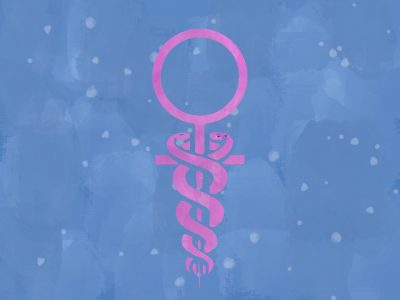Centuries ago, medical treatment bias against women looked much more overtly harmful than it does today. A woman was diagnosed with hysteria if a man deemed her behavior “irregular,” or women would be denied pain relief during childbirth because of prevailing religious beliefs enforced upon their lives.
Now we continue to see this bias — though it is often more discreet. Hidden between a doctor who is skeptical about his woman patient’s pelvic complaints and a medical researcher who has men making up the majority of his participant pool, women have been and are still deprived of the proper medical treatment and care they require. Women deserve to be heard and heeded when they feel something is wrong in their bodies.
It is important to note that gender encompasses more than the male-female binary, and many transgender and nonbinary people suffer from discrimination in the healthcare system. For the purposes of this article, I use the term “women” to mean everyone who identifies as a woman.
The gender bias in our medical systems and the gender bias in medical science research create an unsettling space where women face unique challenges when they seek treatment for chronic pain and serious medical conditions.
Medical doctors — especially men — may disregard or belittle women’s pain and agony, while they consider men gallant for dealing with pain. This is both traditional and ignorant. It reinforces stereotypes and gender roles such as men being superior to women or women being “too emotional” when feeling pain. This contributes to a decrease in pain medications offered to women as well.
Women’s pain is commonly treated as a mental health condition rather than a physical illness. Physical health concerns must be addressed regardless of whether or not a medical professional believes the patient is experiencing what she says she is experiencing.
In the past, the term “psychogenic pain” — though not an official diagnosis — was used to describe pain due to psychological factors, often because no medical explanation was offered for the pain. Now we are aware chronic pain is usually a disruption somewhere in the nervous system and is not solely attributable to psychological conditions.
Nearly 80% of people diagnosed with an autoimmune disease are women, despite autoimmune diseases only affecting 8% of the global population. Underdiagnosed and under researched, women suffer through these diseases often because they are not diagnosed properly. This can be due to women’s symptoms of a specific illness that are different from the average man’s symptoms, or their complaints being ignored.

Along with clinicians, medical researchers are also at fault for bias against women in their studies. Women were often excluded from clinical studies until the National Institutes of Health mandated women be included in all research funded by the NIH in 1993. Some of this exclusion was due to men worrying about women’s hormonal changes negatively affecting the outcome of a study.
Excluding women from medical research led to a cascade of negative health effects for women. For example, the symptoms of a heart attack are often different for men and women, but doctors tend to recognize and diagnose men’s symptoms because those are seen as typical.
When women experience heart attacks, it is often misattributed to panic attacks or hypochondria. Women also receive a later diagnosis for cancer and cardiovascular disease.
The medical training community is attempting to solve the problem by identifying learning strategies like self-reflection and empathy awareness, while women’s health advocates recommend healthcare professionals learn to be more transparent about treatment options. These are common sense building blocks, but more must be done through health policy, internal bias elimination and inclusion of all genders in research studies.
Women are revealing the agony and isolation they endure when looking for illness treatment. The loneliness experienced by women through the scrutinizing process of receiving a diagnosis for a chronic illness is left unsaid when care is taken out of the equation and medical doctors only aim for a quick fix.
Author Meghan O’Rourke wrote a phenomenal novel about the complexities of chronic illness discovery and treatment called, “The Invisible Kingdom: Reimagining Chronic Illness.” In a recent interview with the LA Review of Books, O’Rourke described how the United States healthcare system aims to fix — not treat or care for — medical disease and disorder. She has listened to many people speak of their experiences with doctors “psychologiz[ing] the subjective experience of illness,” especially for women.
Our women patients need consistent, quality care. The medical community must research, reflect and take action to uphold equity in women’s healthcare.





















































































































